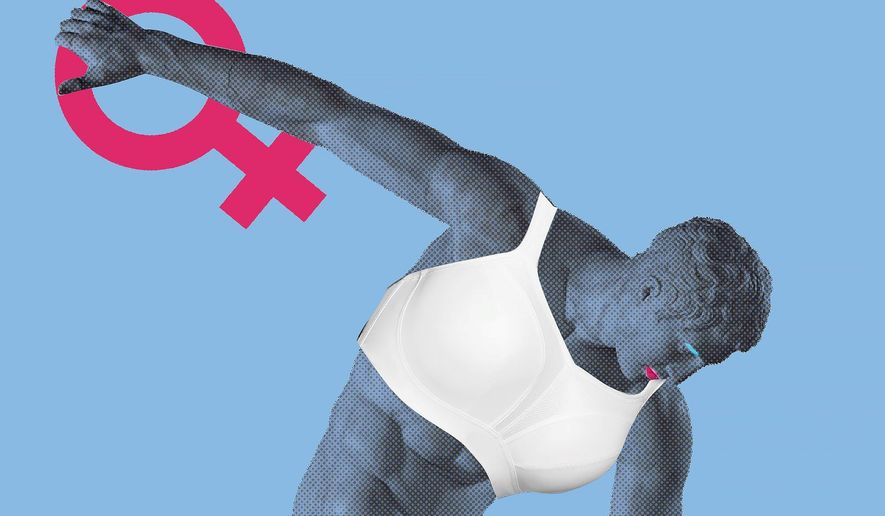OPINION:
Some time ago, I wrote that there was an easy and suave way to solve transgender people’s yearning for an opportunity to compete with female athletes.
My solution will end the heartless intimidation of these tender youths — the biological males, not the girls. It will allow the transgenders to thrive against the conventional ways of female sports, which can be brutal. Having researched the problem carefully, I take it that the word “bullying” comes very close to the heart of the matter. Mature, serious and sober do-gooder organizations such as the American Civil Liberties Union rarely take up the issue of trans competitors in girls’ athletics without mentioning bullying. The bullying comes from the girls, not their peers who were male at birth. Some of the girls can be brutes.
The trans athletes may be bold enough to show up at a girls’ event wearing a girls’ frilly competitive outfit. Think of the feminine frills worn by female tennis stars or the tattoos worn by female boxers. Yet even the toughest trans athlete has got to be shaken after one of the burly girls snickers at him/her or offers to hold his/her towel. There are dozens of ways to bully a transgender athlete, and no matter how aloof or calloused he or she might be, every slight has its effect.
Recently Deirdre Schifeling, the ACLU’s national political director, spoke out against a Republican anti-trans drift and, in doing so, revealed the ACLU’s obsession with the vulnerability of transgender youth. As she put it, “Today’s vote was a cynical attack against some of the most vulnerable youth in our country.”
Her ally on the House floor, Rep. Donald Payne, chimed in, chastising congressional Republicans for “nothing more than an attempt to score cheap political points and bully transgender youth.”
Well said, Ms. Schifeling and Mr. Payne, who speak for many liberal-minded people. The bullying of transgender people has got to stop. Yet how will it end?
This is where my solution comes in. Years ago, when the female of the species began swimming competitively, they were faced with many of the same problems that trans competitors are faced with today. Some of the girls thought they could swim as fast as the boys. Some still believe that.
I doubt that the girls wanted to dress with the boys. People were more sensible then, but some thought they would compete with the boys. Good sense prevailed, and the girls settled for competing with other girls while the boys competed with the boys and never thought of competing with the girls. A similar evolution took place in track and field and other athletic pursuits. Why cannot a similar evolution take place among those who wish to transform their gender? Why cannot there be a third and, for that matter, a fourth category for transgender athletes?
When I made my suggestion some years ago, I, thought I was going to be inundated by calls from the television stations and the newspapers. At least, I thought there would be interest shown in the world of sport. My plan was greeted by thunderous silence. My suggestion would introduce a new category for sexually revised sector of our society that could compete with others who did not feel comfortable with things as they were and wanted change, change that would discomfort no one.
Well, even transgender people would not endorse my plan. Even the ACLU was remaining mum, and I was counting on it. I figured that if I could win the ACLU’s support, I might even win the Democratic Party’s support or at least that of the Democratic Party as it is now constituted in California. My conclusion is straightforward.
The transgender athletes who want to compete with the girls, however, are really interested in something other than liberation. They want to make a spectacle of themselves. They want to be at the center of a controversy that will change the face of sport in America. All I can say is that I tried.
Glory to Ukraine!
• R. Emmett Tyrrell Jr. is founder and editor in chief of The American Spectator. He is a senior fellow at the London Center for Policy Research and the author most recently of “The Death of Liberalism,” published by Thomas Nelson Inc. His memoirs, “How Do We Get Out of Here: Half a Century of Laughter and Mayhem at The American Spectator — From Bobby Kennedy to Donald J. Trump,” will be published by Post Hill Press in September and can be ordered online now from Amazon and Barnes & Noble.




Please read our comment policy before commenting.